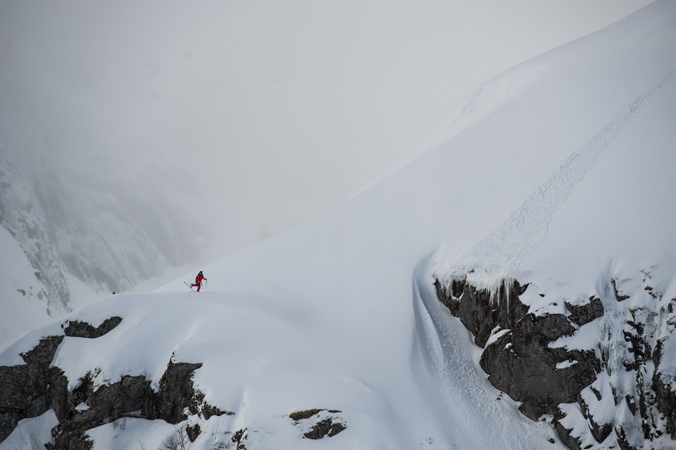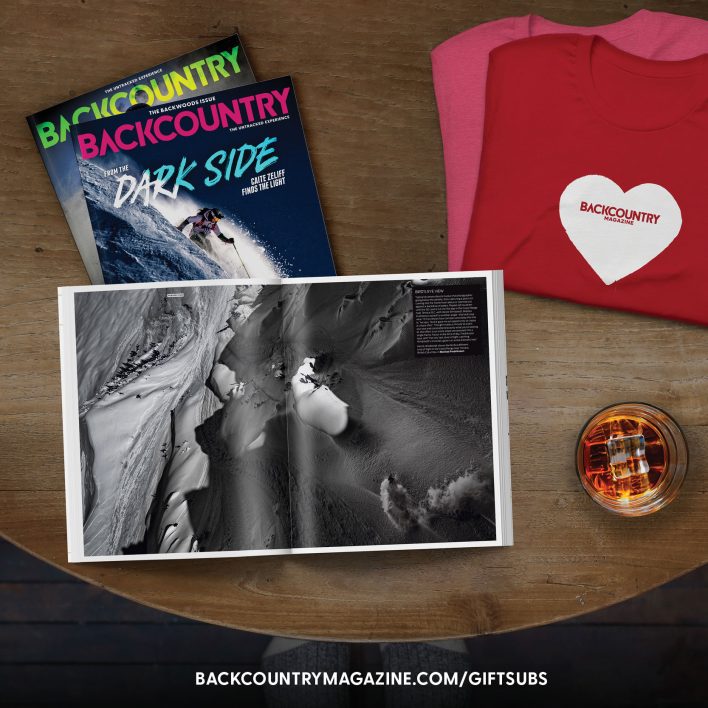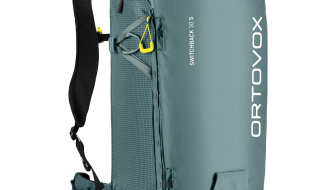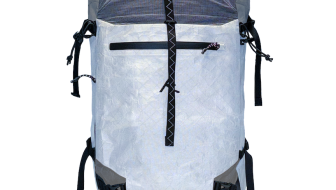
Rachel Burks rises above Norway’s Lofoten Mountains. [Photo] Re Wikstrom
It’s early morning and unusually cold, the kind of dawn that nips at your heels and prompts you to get going, to get skins on, to unsnag your hair from your zipper. To just move.
It’s dark, but the sun is trying to come up, and I coax it along. My partners are all in their own worlds, focused, driven and bound together by this common interest—wondering what the conditions will really be like and hoping for the goods.
Starting off slowly gives me time to reflect on an event I ran last night, as part of the group I started for women who like to backcountry ski and ride. With help from a handful of volunteers, we put on events, like guest speakers and slideshows. We also advocate for women in the backcountry realm and gather for beacon practices, ski days, hut trips and the like. I tend to beat myself up before giving myself credit and, this morning, I wonder if our group is actually sexist, because we exclude men.
Being a historian, and having studied American history for most of my adult life, I’m fascinated by this question of exclusion. Am I being the same kind of sexist that America has been for the last…well, since even before our founding? What does it mean to be sexist, and how has sexism evolved over time?
The sun pops up over the mountains and lights up the lake in complicated patterns. I take a deep breath and look around at the snow-covered trees. The whole scene gives me an overwhelming sense of peace, but it doesn’t stop these voices in my head.
What do average, everyday Americans really know about the oppression of women throughout American history? We prop America up as the greatest democracy on earth, yet half the population couldn’t vote for about half of our democratic history. Any social, economic or political advancement that women have gained over the course of our history was fought for—they were arrested, beat up, lost their jobs, risked their lives.
Today is better, no doubt. But obviously there is more work to be done. I’m tired of this conversation circling my mind with no end in sight. I’m tired of people not knowing our history and, from it, what we can learn.
This skintrack is getting steeper. I use my poles to adjust my heel risers and take a breath. I estimate I’m about 30 minutes in. It’s cold. Just keep moving.
The conversation I’m having with myself shifts back to the women’s group I run. It isn’t so much about excluding men, as is it about including women. The outdoor sports industry has always been a bro fest. What guys may not understand is what that means in real time—the general lack of respect for women’s opinions in the industry at large; using our bodies to sex up advertising or marketing; making female competitors models first and athletes second; walking past the woman working at an outdoor shop to seek out a man’s advice.
But let’s acknowledge the ways in which the outdoor industry is changing, the growing awareness of some of these issues and attempts being made by the industry to be more inclusive. It is happening.
Breathing heavily as the slope gets steeper, I slow my pace ever so slightly to recover for a moment. Around me, the view expands as I climb higher. A slight northeast wind has picked up, and I pull on my hood. I wonder about wind loading and take notice of the approaching ridgeline. Then I focus on the lake for a moment and think, magic. The world’s wonders lie all around me. The enchantment of nature makes me grateful and satisfied, and as I continue up, my thoughts drift back to last night’s gathering.
When women gather together, we have a safe space to simply be ourselves without worrying about what men might think. We step it up and become leaders. In the absence of men, women come first; women’s experiences take center stage. We want women to learn new skills, explore, dream and achieve. There is nothing brewing about the purposeful oppression of men in the process, nothing about excluding men with malicious intent. Quite frankly, for once, it isn’t about men at all.
My friends are waiting for me near the top before we can discuss our next move. I grab my phone and take a quick picture of their bodies shadowed against the blue sky as snow swirls and dances in the air. They smile at me as I approach. One of them says, “Whatcha thinking about, Whitney?”
“Not much,” I reply, poking my pole in the snow and smiling back. There’s nothing quite like these conditions or this setting. We can all agree on that.










Such a cool story! I think it is those small, conscience decisions we make that can have a nice impact. Thanks for sharing!